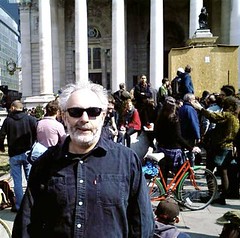According to a newspaper that I was reading on a plane, the actress Gwyneth Paltrow thinks that shampoo causes cancer.
"The research is troubling; the incidence of diseases in children such as asthma, cancer and autism have shot up exponentially and many children we all know and love have been diagnosed with developmental issues like ADHD [Attention Deficit Hyperactivity Disorder]."
[From Gwyneth Paltrow slammed by experts over shampoo cancer claim - Telegraph]
She says that childhood cancer cases are growing exponentially (they're not, incidentally: in fact the rate hasn't changed for a decade) because of the "environmental toxins" in shampoo. I don't know about incidence of ADHD (or, as some people call it, "busy parent syndrome") but I strongly doubt a shampoo-related link. Anyhow, the newspapers reported a leading expert in the field (an actual scientist) as calling her views "loopy", as I'm sure they are, and saying that you "may as well ask someone on the Underground" about the causes and incidence of childhood cancers. On this I'm sure he's wrong: the average person on the Underground may well have stupid or uneducated views on the subject of childhood cancers, but they are unlikely to have such loopy views. This is because the views of the celebretariat are much loopier than the views of merely uninformed people. I'm not having a go at the noted actress Ms. Paltrow. While she is
the daughter of noted film director Bruce Paltrow and Tony award-winning actress Blythe Danner,
[From Gwyneth Paltrow - Biography]
her success has been earned entirely on her own merits. I don't really know much about her, except that she was OK in Iron Man. Oh, and I never liked Coldplay, and she is married to one of the band members, Mr. Chris Martin, who is on record as saying that
I think shareholders are the greatest evil of this modern world.
[From Coldplay's frontman turns on 'evil' shareholders - News, Music - The Independent]
He doesn't mean the shareholders of EMI, who paid the band millions of pounds for a five album deal, of course, but shareholders in other enterprises who put AIDS, climate change, genocide and ethnic cleansing into the shade. So he clearly has some pretty loopy views too. But I'm not picking him out either. I'm just making a general point about the loopiness of celebrities views.
Now, it's easy to imagine the launch pad for loopy opinions in these privileged and distant lives. They have no natural dampers for their mental oscillations. If you are an A-lister, you spend your days surrounded by flunkies who reinforce your opinion that you are the centre of the world. They cater to your every whim. You control every aspect of your environment. Whatever you want -- whether it's a bath of champagne or a belief in aliens -- there are people around you to make your every whim come true. In the circumstances, why would you listen to science, when all that science tells you is that you are not the centre of the world. Worse still, rationality may kick in the door at any time, shouting out awful truths: "you're not special, you're lucky" or "you only got this job because of your famous Dad", or similar undermining messages.
Ultimately, I suspect that there is a fundamental and irreconcilable problem with science, though, which is why they have no interest in engaging with it. Science tells that A-listers that they are going to get old and die and until science has a more positive message for them, they'll continue to channel long-dead Native American spirit guides rather than pick up an issue of Scientific American.
In the future, everyone will be famous to fifteen people.
[posted with
ecto]

